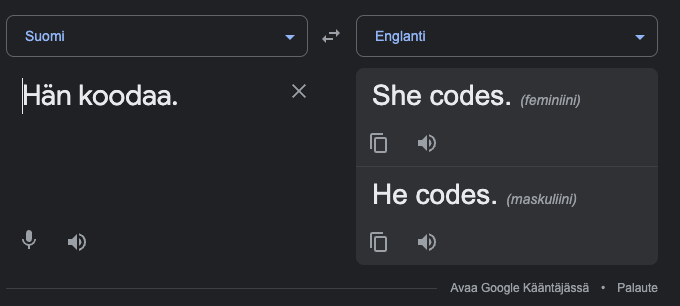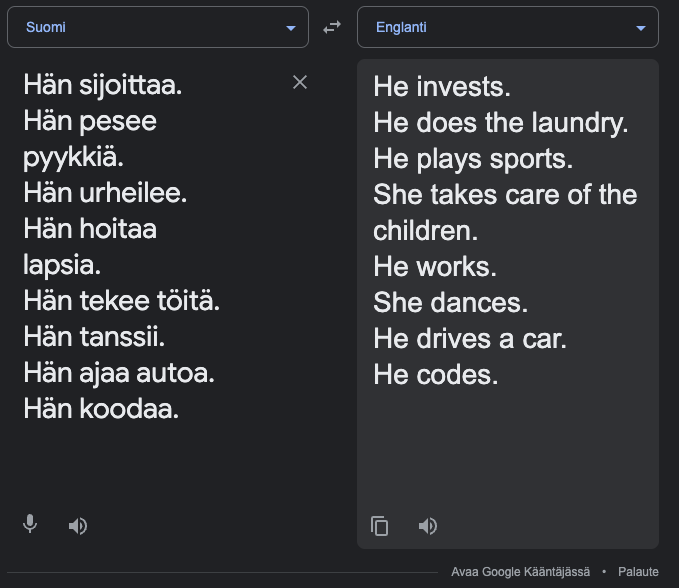The Language We Use Matters

Eevis
Posted on March 11, 2023

This is my fourth year of writing to Dev's campaign around International Women's Day, previously known as "Nevertheless, She/They coded" and now "We coded". You can find my older posts above.
This year, I wanted to take a bit of a different approach. I want to talk about language and why it matters. In this blog post, I will first share some of my own experiences around the theme and then discuss why this all matters.
I've been following different conversations for a long time now, and if I got a cent every time someone defaults to "he" or uses some gendered words like "guys" or "ukot" (a colloquial Finnish word for (older) men) when talking about developers, I would be so rich.
You might argue that all this doesn't matter; it's just words. But what I'd love to remind everyone about is that words hurt. Words might even drive people out of companies and the field altogether. If you continuously hear that the right kind of developer is something you're not, you might start to believe that false narrative.
For me, one of the many stories I could tell, ending "Nevertheless, Eevis coded," is about language. It's about hearing so many times about an ideal developer and how that developer is always he. And you know, I am not. And that's why I'm speaking up and trying to change the way we speak - little by little.
In this blog post, I will first discuss language and its usage more and then look into what we can do to be part of the change.
Language We Use Builds Reality
I firmly believe language is one of the most essential parts of building our reality. If we always speak about, e.g., potential users using the pronoun "he," we often unconsciously build products for "him." In these cases, it is easy to forget that the needs might differ for, e.g., women and non-binary people.
Also, if we always talk about developers using the pronoun "he," it contributes to a culture where other genders don't feel welcome. This behavior is often unconscious; people don't do it because they're evil. But that's how the human brain works - and that's the precise reason why we need to pay attention to the words we use.
The Default Man
When we use the language, man is often the default. Let's start with sports. There is a tournament called UEFA European Championship, and then there's UEFA Women's Championship. In this comparison, women are something that needs to be pointed out, and men are implicit. Or, someone in some sport would say "open" (I don't know how it is for football), but let's face it: "open" usually means men's league.
Man-default can also be found in expressions such as "manning the station," "man-hours," or "chairman." It is visible in other languages as well. For example, in Finnish, despite having only one personal pronoun for all genders, we have words such as "lakimies" (=lawyer, a literal translation would be "law man"), "palomies" (fireman), or "miehittää" (same as in "manning the station").
Furthermore, our language affects the data we use to train algorithms. For example, Google Translate has translated pronouns in interesting ways for a long time. Here's a Twitter thread from two years ago showing how it used to be:
However, Google has made some improvements after that. But only if you write one sentence:
I'd love to see a gender-neutral variant - after all, "they code" would include a broader amount of people and not enforce the binary norm. But if you feel like what I'm saying is wrong and language doesn't matter, and we still need to keep the stereotypes, worry not! It's still the same for multiple sentences. Or, almost the same - apparently, men can do laundry now:
And according to Google, the default pronoun for coding is still "he."
I would just love to blame the technology and say it is how it is, and tech is neutral (as some keep saying), but it's not true. Technology is what we build it to be, resulting from the data we have. And in the case of language-related applications, the data is, well, the language we use. We enforce these stereotypes if we keep using phrases like "he codes" or defaulting to "he" as a developer.
So What Should We Do?
If you have read this far, you might ask, "what can I do?" and wonder how we can change the situation. I have some suggestions, and I'd love to hear more ideas in the comments!
Pay attention to the words you and the people around you are using
First of all, start paying attention to the words you're using. Do you enforce the man-default by using such expressions? Do you always default to "he"? Try "they"!
Changing the words we use doesn't always feel natural. In fact, it might feel really awkward at first. But keep doing it - it will get easier. From my own experience, switching from using "he" or "he or she" felt really awkward at first, but today it feels weird not to use "they" as the default when speaking about someone hypothetical.
So, start first with yourself. And then start paying attention to people around you and their language. And if you hear them using words like "he" as default or using gendered words from different professions or other examples I gave above, mention it to them.
However - language is very personal for us. So when saying anything about how another person uses language, approach it with empathy. They might feel that you're attacking them and that you're saying that they're doing those things because they're evil. It's good to remind them that it's not about them as a person but the words they use - and you don't assume they're doing it on purpose.
Of course, if they have done something intentionally (like, misgendered you), that's a different situation.
Listen to the people who feel excluded
Another point I want to bring up is to listen to those who feel excluded. Don't try to suppress their experiences. A good example is the discussion about using the word "guys" in phrases like "hey guys." I feel excluded whenever someone addresses a group I'm in with the words "hey guys." And when I try to speak about it (like in this blog post), usually there is someone (or several) people telling me that it's gender neutral, and I'm just delusional. Or something like that.
Another example of the same behavior is when talking about racism and some racist phrases. At least in Finland, some (white) people feel like they can use the N-word because it has been used as "neutral" in the past, and the newspapers have used it. And when they do (even in YLE (Finnish national broadcasting company) in a prime-time show), and someone says that's racist, they get defensive and want to defend their right to use that word.
These all center around the one with the privilege and them keeping their power. But what if... What if we actually listened to people, and if someone from the non-dominant position says that a word is excluding, we'd just listen and use another word? For guys, there are so many other non-gendered variants. And for the N-word... That's something that should be dropped altogether.
Wrapping Up
In this blog post, I've been discussing language and why building an equal world with our words is important. I gave two suggestions as action points. What do you think? Do you have more suggestions?

Posted on March 11, 2023
Join Our Newsletter. No Spam, Only the good stuff.
Sign up to receive the latest update from our blog.

